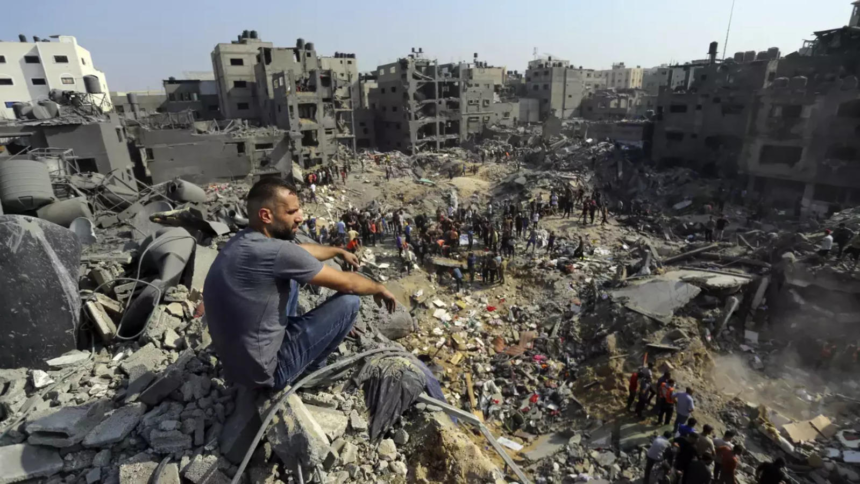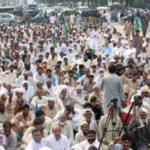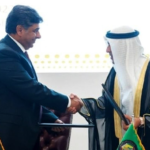RAFAH, Gaza Strip, May 6 (Reuters) – Israel told Palestinians to evacuate parts of Rafah on Monday in what appeared to be preparation for a long-threatened assault on Hamas holdouts in the southern Gaza Strip city where more than a million war-displaced people have been sheltering.
Instructed by Arabic text messages, telephone calls, and flyers to move to what the Israeli military called an “expanded humanitarian zone” 20 km (7 miles) away, some Palestinian families lumbered out under chilly spring rain, witnesses said.
A senior official of Hamas, the militant Palestinian group that governs Gaza, told Reuters the evacuation order was a “dangerous escalation that will have consequences”.
“The U.S. administration, alongside the occupation, bears responsibility for this terrorism,” the official, Sami Abu Zuhri, told Reuters, referring to Israel’s alliance with Washington.
Israel’s military said it had begun encouraging residents of Rafah to evacuate in a “limited scope” operation. It gave no specific reasons, nor did it say if any offensive action might follow.
“It has been raining heavily and we don’t know where to go. I have been worried that this day may come, I have now to see where I can take my family,” one refugee in Rafah, Abu Raed, told Reuters via a chat app.
Witnesses said the areas in and around Rafah to which Israel wants to move people are already crowded and there is almost no room for more tents to be added.
An Israeli offensive in Rafah “would be devastating for 1.4 million people” sheltering there, the U.N. agency for Palestinian refugees, UNRWA, said on X, adding it would keep a presence in Rafah as long as possible to provide aid.
But we know we are not alone because countless decent people around the world support our just cause.
Seven months into its war against Hamas, Israel has been threatening to launch incursions in Rafah, which it says harbours thousands of Hamas fighters and potentially dozens of hostages. Victory is impossible without taking Rafah, it says.
The prospect of a high-casualty operation worries Western powers and neighbouring Egypt, which is trying to mediate a new round of truce talks between Israel and Hamas under which the Palestinian Islamist group might free some hostages.
The Rafah plan has opened an unusually public rift between Israel and Washington. Speaking to his U.S counterpart, Israeli Defence Minister Yoav Gallant linked Monday’s operation to the deadlock in indirect diplomacy, which he blamed on Hamas.
“During their discussion, Gallant discussed the efforts undertaken to achieve the release of hostages and indicated that at this stage, Hamas refuses the frameworks at hand,” the Israeli Defence Ministry said in a statement.
“Gallant emphasized that military action is required, including in the area of Rafah, at the lack of an alternative,” it added
An Israeli broadcaster, Army Radio, said evacuations were focused on a few peripheral districts of Rafah, from which evacuees would be directed to tent cities in nearby Khan Younis and Al Muwassi.
Many residents in Rafah said they had received telephone calls to evacuate their homes in the targeted area, in line with the army announcement.
In an overnight aerial attack on Rafah, Israeli planes hit 10 houses, killing 20 people and wounding several, medical officials said.
Three Israeli soldiers were killed on Sunday in a Hamas rocket attack near Rafah, at the Kerem Shalom crossing into Gaza, while Palestinian health officials said at least 19 people were killed by Israeli fire.
Sunday’s crossing attack came as hopes dimmed for ceasefire talks in Cairo, with Hamas reiterating its demand for an end to the war in exchange for the freeing of hostages, and Israeli Prime Minister Benjamin Netanyahu flatly ruling that out.
“Our just war in Gaza continues with the exact same goals: the release of all hostages and the defeat of Hamas,” Israeli Foreign Minister Israel Katz said on Monday on X, blaming the Palestinian group for the lack of progress in the Cairo talks.
The war began after Hamas stunned Israel with a cross-border raid on Oct. 7 in which 1,200 people were killed and 252 hostages taken, according to Israeli tallies.
More than 34,600 Palestinians have been killed, 29 of them in the past 24 hours, and more than 77,000 have been wounded in Israel’s assault, according to Gaza’s health ministry.
On Sunday, a top U.N. official accused Israel of continuing to deny the United Nations humanitarian access in the Gaza Strip, where the U.N. food chief warned a “full-blown famine” has taken hold in the north of the enclave of 2.3 million people.
While not a formal declaration, World Food Programme Executive Director Cindy McCain said, in an NBC News interview broadcast on Sunday, that based on the “horror” on the ground: “There is famine, full-blown famine, in the north, and it’s moving its way south.”












